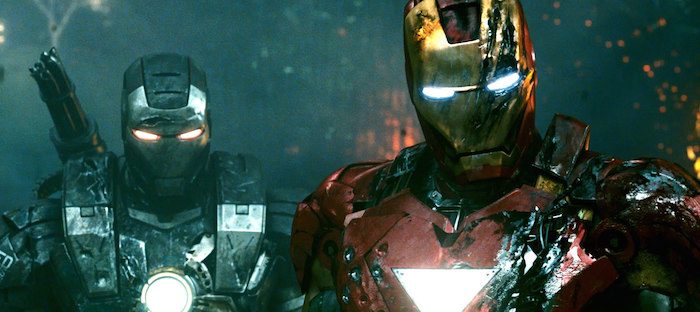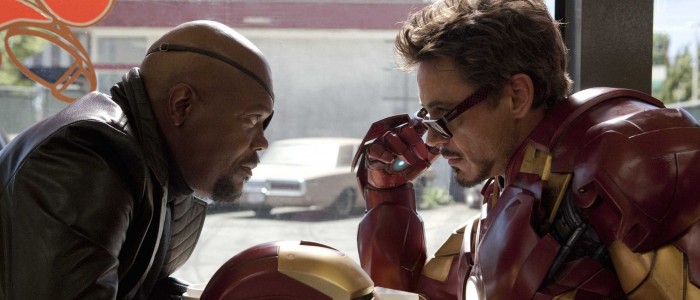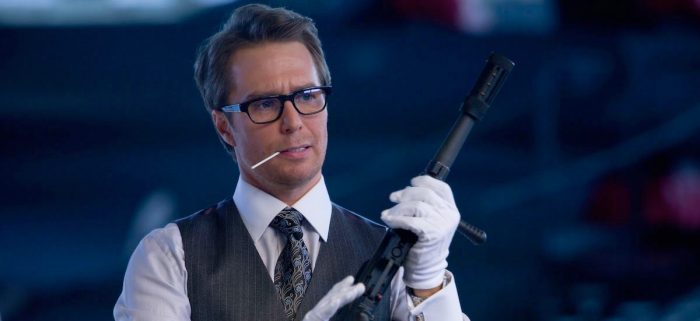
(Welcome to Road to Endgame, where we revisit all 22 movies of the Marvel Cinematic Universe and ask, “How did we get here?” In this edition: Marvel drops the ball with Iron Man 2.)
Iron Man 2 is “fine,” in the most middle-of-the-road, passive-watch sense. The descriptor feels apt, since the film features neither the novel spark of its predecessor, nor the emotional highs of Marvel’s future installments. Truth be told, it doesn’t have enough by way of narrative risks to be a memorable failure either. However, it helped further cement Tony Stark and Robert Downey Jr. as key fixtures of popular culture.
Even as a feat of world-building, Iron Man 2 does little to expand on previous films. But more pertinently, it’s emblematic of why the early Marvel movies had such a muddled approach to politics. Like Iron Man before it, the film’s military funding doesn’t just result in a wrongheaded political outlook, but in a confused character-story, thrown further off balance by the need to juggle popcorn entertainment, sequel setups and a world where, once again, private industry and hostile foreign forces bear all the responsibility of war.

A Propaganda Sequel
Like its Pentagon-funded predecessor, Iron Man 2 is divorced from anything resembling political reality. It’s the second of Marvel’s films made with military assistance — Captain America: The Winter Soldier came next, followed by Captain Marvel — and it falls back on Iron Man’s problem of constantly deflecting the blame for global conflict away from the U.S. military. This framing, while questionable in and of itself, has ripple-effects for the story the film thinks it’s telling.
Both Iron Man films were made with military subsidies — in this case, equipment and locations were insured for $20 million — so the Department of Defense was granted final script approval. (You can download the film’s D.O.D. production agreement here, obtained via SpyCulture under the Freedom of Information Act).
During the film’s prologue, we’re shown a brief newspaper snippet with the headline “Iron Man Stabilizes East-West Relations,” before Tony Stark shows up to his eponymous Expo (see: eXpo). He calls the preceding six months “the longest period of uninterrupted peace the world has ever seen,” which, apart from being a lazy narrative assertion without further clarity, happens to clash directly with the film’s own story.
Iron Man 2 is set into motion when the U.S. government subpoenas Tony Stark to appear in front of an arms committee… Well, no, it’s actually set into motion when Ivan Vanko (Mickey Rourke), the son of Anton Vanko, a man wronged by Stark’s father, crashes Stark’s reckless Grand Prix stint… Actually, it’s hard to be certain of which incident has more impact on the plot, given that one is exposition with no story momentum, and the other is an action scene divorced from character. Either way, Iron Man 2 feels like two separate films at first — and by the end, for that matter.
While the committee hearing establishes Stark’s relationship to his creation (“I am Iron Man. The suit and I are one.”), much of it is spent re-establishing the specifics of this so-called world at peace, a global armistice brought about by one man. At the hearing, not only are we introduced to private weapons manufacturer Justin Hammer (Sam Rockwell), we’re also given glimpses into the comically ineffectual — though most certainly active — military R&D of nations like Iran and North Korea, whose own Iron Man projects are being developed by Hammer. These countries aren’t framed as real threats, despite their militaries being supplied by the same weapons manufacturer as America.
The world is in an arm’s race to create its own Iron Men. Col. James Rhodes (Don Cheadle), the future War Machine, wants these weapons for the United States, while antagonist Justin Hammer seeks to build them for whoever can line his pockets. Just like the first Iron Man, the villains of this political climate are anyone who would use these weapons against America, even if America is just as, if not more likely to use them first. Like Obadiah Stane (Jeff Bridges) before him, Hammer is only a villain because of his double-dealing, while Rhodes is a hero despite buying from Hammer. Rhodes’ War Machine armour was even partially designed by the U.S. Air Force (per the Pentagon’s Hollywood database, also obtained via SpyCulture), in order to “meticulously and accurately reflect realistic aircraft markings.”

A World At War
Per the video footage seen in the film — displayed by Stark himself, no less — this is far from a world at peace, regardless of how many times Stark calls himself a “nuclear deterrent.” It is, at best, a world locked in a global Cold War, even though assertions of worldwide armistice come from “objective” narrative sources (news clippings and the likes) outside the protagonist’s viewpoint. The world of the film is exactly as Tony Stark sees it, so his outlook is rarely challenged, a problem that’s exacerbated when his father’s questionable legacy comes into play.
In a better film, one might be given reasons for the discrepancy between claims of peace and continued private militarization. An industry thriving on conflict would be unlikely to let the conflict end (Iron Man and Iron Man 3 even touch on this dynamic), but Iron Man 2 simply zips past its own premise, creating a narrative disconnect.
The villains’ plot involves Justin Hammer recruiting Ivan Vanko to create Iron Man-esque suits (and later, drones) for the U.S. military. It’s a direct and logical escalation of the first film, which focused on private arms manufacture and underhanded dealings. The sequel however, is less concerned with what suit or drone warfare would mean (for America, and for Stark) in terms of responsibility, and more intent on having Stark talk about how he “privatized world peace,” without exploring how these two ideas might come into conflict. Besides, Hammer’s American military drones are only framed as a threat when they’re controlled by an evil foreigner.
In a story in which global militaries are still active (and still an active threat to Iron Man), one would hope someone — or some action or event — would challenge Stark’s view on peace, at least for the sake of dramatic conflict. Then again, America stockpiling weapons being conflated with a peaceful status quo is par for the course for military propaganda. “Peace means having a bigger stick than the other guy,” and all that.
Despite the characters paying lip service to peace, the world is exactly as it was during the events of Iron Man six months prior. We’re never told or shown anything Stark has done to actually change things. This would require treating the Marvel Cinematic Universe as something resembling the real world — a world in which Iron Man would need to oppose American militarism and foreign occupation in order to achieve a peaceful outcome.
In lieu of a challenging narrative, we’re instead presented with a movie in which Tony Stark watches movies.
Continue Reading Road to Endgame >>
The post Road to Endgame: ‘Iron Man 2’ Was the MCU’s First Major Misfire appeared first on /Film.
from /Film https://ift.tt/2V4U8qN
via IFTTT
Comments
Post a Comment